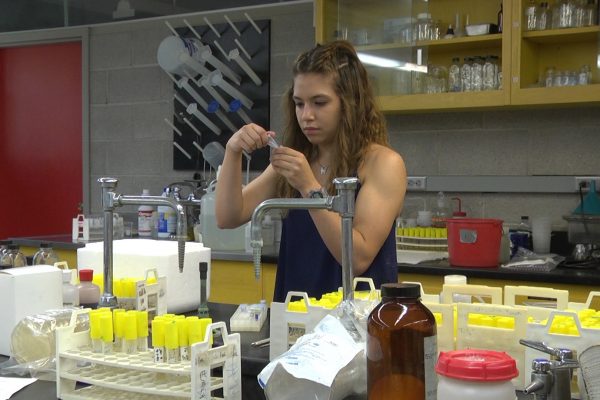Team grows viruses to explore phage therapy
Marisa Flores ’19 had one goal in the lab—growing viruses.
“The kind of virus we are growing is bacteriophage,” Flores said. “It attacks bacteria, and bacteria are abundant in the world. You could use it for something called phage therapy, which could help with staph infections, strep, all of that nasty stuff.”
Marisa worked with Professor of Chemistry Jeff Cardon to perfect their process of growing viruses for the Cornell Summer Research Institute.

“All bacteria are infected by viruses and those viruses have been used in the past for phage therapy,” Cardon said. “So, if a person gets a bacterial infection, nowadays we treat with antibiotics, but 100 years ago, people were interested in treating with bacterial viruses. You inject the virus, the virus attacks the bacteria, kills it, and of course, bacterial viruses don’t infect humans. So, there’s no safety issue with that.”
Marisa said they spent a lot of time problem-solving when issues came up, especially when their methods of growing viruses just didn’t work.
“Working through the issues and finding different ways to approach problems that we have encountered is an experience that I haven’t had in the past,” Flores said. “I think this is really nice to see how frustrating it can be and figure out how to work through it.”
The two knew if they could perfect the process of growing viruses, they would be one step closer to helping with a big health issue.
“This idea of phage therapy was around 100 years ago and died away because antibiotics were cheap and effective,” Cardon said. “Now, antibiotics are expensive and ineffective, so the interest in phage therapy is renewed. People are really looking very seriously at using bacterial viruses to treat bacterial infections, especially infections that are resistant to the standard antibiotics that people use.”
Marisa said the opportunity was important to her as she works toward her goals of going to medical school and becoming a trauma surgeon.
“I really want to research at a medical campus next summer,” Flores said. “This experience was nice because I knew everyone that I working with, and I already had a relationship with my professor. So, I think CSRI is something that would be nice to put on a resume that will lead me to another experience next summer.”
Watch the video story:
Tags: chemistry



